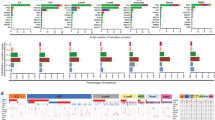Abstract
An important mechanism for the activation of proto-oncogenes in human breast and other cancers is gene amplification, which results in gene overexpression at both the message and the protein levels. Recent studies have demonstrated that oncogenes rarely if ever become amplified in isolation, but rather are present on large amplicons that contain multiple genes. More detailed analysis of these amplicons has revealed the presence of many candidate breast cancer oncogenes. The broad goal of this issue of Breast Cancer Research and Treatment is to review the current state of our understanding of the causal role of defined genetic alterations that occur in human breast cancers, and to discuss the case for the mechanistic significance of several candidate oncogenes. As will be seen, these studies have revealed a remarkable genetic complexity and heterogeneity in human breast cancer that must be dissected in order to improve our mechanistic understanding of disease progression, and to develop effective new drugs against relevant molecular targets.
Similar content being viewed by others
References
Ethier SP: Growth factor synthesis and human breast cancer progression. J Natl Cancer Inst 87: 964-973, 1995
Slamon DJ, Clark GM, Wong SG, Levin WJ, Ullrich A, McGuire WL: Human breast cancer: correlation of relapse and survival with amplification of the HER-2/neu oncogene. Science 235: 177-182, 1987
Borg A, Tandon AK, Sigurdsson H, Clark GM, Ferno M, Fuqua SAW, Killander D, McGuire WL: HER-2/neu ampli-fication predicts poor survival in node-positive breast cancer. Cancer Res 50: 4332-4337, 1990
Woods Ignatoski KM, LaPointe AJ, Radany EH, Ethier SP: ErbB-2 overexpression in human mammary epithelial cells confers growth factor independence. Endocrinology 140: 3615-3622, 1999
Woods Ignatoski KM, Maehama T, Markwart SM, Dixon JE, Livant DL, Ethier SP: ErbB-2 overexpression confers PI 3_-kinase-dependent invasion capacity on human mammary epithelial cells. Br J Cancer 82: 666-674, 2000
Muller WJ, Sinn E, Pattengale PK, Wallace R, Leder P: Singlestep induction of mammary adenocarcinoma in transgenic mice bearing the activated c-neu oncogene. Cell 54: 105-115, 1988
Siegel PM, Dankort DL, Hardy WR, Muller WJ: Novel activating mutations in the neu proto-oncogene involved in induction of mammary tumors. Mol Cell Biol 14: 7068-7077, 1994
Leyland-Jones B, Smith I: Role of herceptin (r) in primary breast cancer: views from North America and Europe. Oncology 61: 83-91, 2001
Spiridon CI, Ghetie MA, Uhr J, Marches R, Li JL, Shen GL, Vitetta ES: Targeting multiple Her-2 epitopes with monoclonal antibodies results in improved antigrowth activity of a human breast cancer cell line in vitro and in vivo. Clinical Cancer Res 8: 1720-1730, 2002
Jarvinen TA, Tanner M, Rantanen V, Barlund M, Borg A, Grenman S, Isola J: Amplification and deletion of topoisomerase II alpha associate with ErbB-2 amplification and affect sensitivity to topoisomerase II inhibitor doxorubicin in breast cancer. Am J Pathol 156: 839-847, 2000
Fiddes RJ, Campbell DH, Janes PW, Sivertsen SP, Sasaki H, Wallasch C, Daly RJ: Analysis of Grb7 recruitment by heregulin-activated ErbB receptors reveals a novel target selectivity for ErbB3. J Biol Chem 273: 7717-7724, 1998
Han DC, Shen TL, Guan JL: Role of Grb7 targeting to focal contacts and its phosphorylation by focal adhesion kinase in regulation of cell migration. J Biol Chem 275: 28911-28917, 2000
Tanaka S, Sugimachi K, Kawaguchi H, Saeki H, Ohno S, Wands JR: Grb7 signal transduction protein mediates metastatic progression of esophageal carcinoma. J Cell Physiol 183: 411-415, 2000
Woods Ignatoski K, Ethier SP: Constitutive activation of pp 125fak in eleven newly isolated breast cancer cell lines. Breast Cancer Res Treatment 54: 173-182, 1999
Author information
Authors and Affiliations
Rights and permissions
About this article
Cite this article
Ethier, S.P. Identifying and Validating Causal Genetic Alterations in Human Breast Cancer. Breast Cancer Res Treat 78, 285–287 (2003). https://doi.org/10.1023/A:1023078722316
Issue Date:
DOI: https://doi.org/10.1023/A:1023078722316




